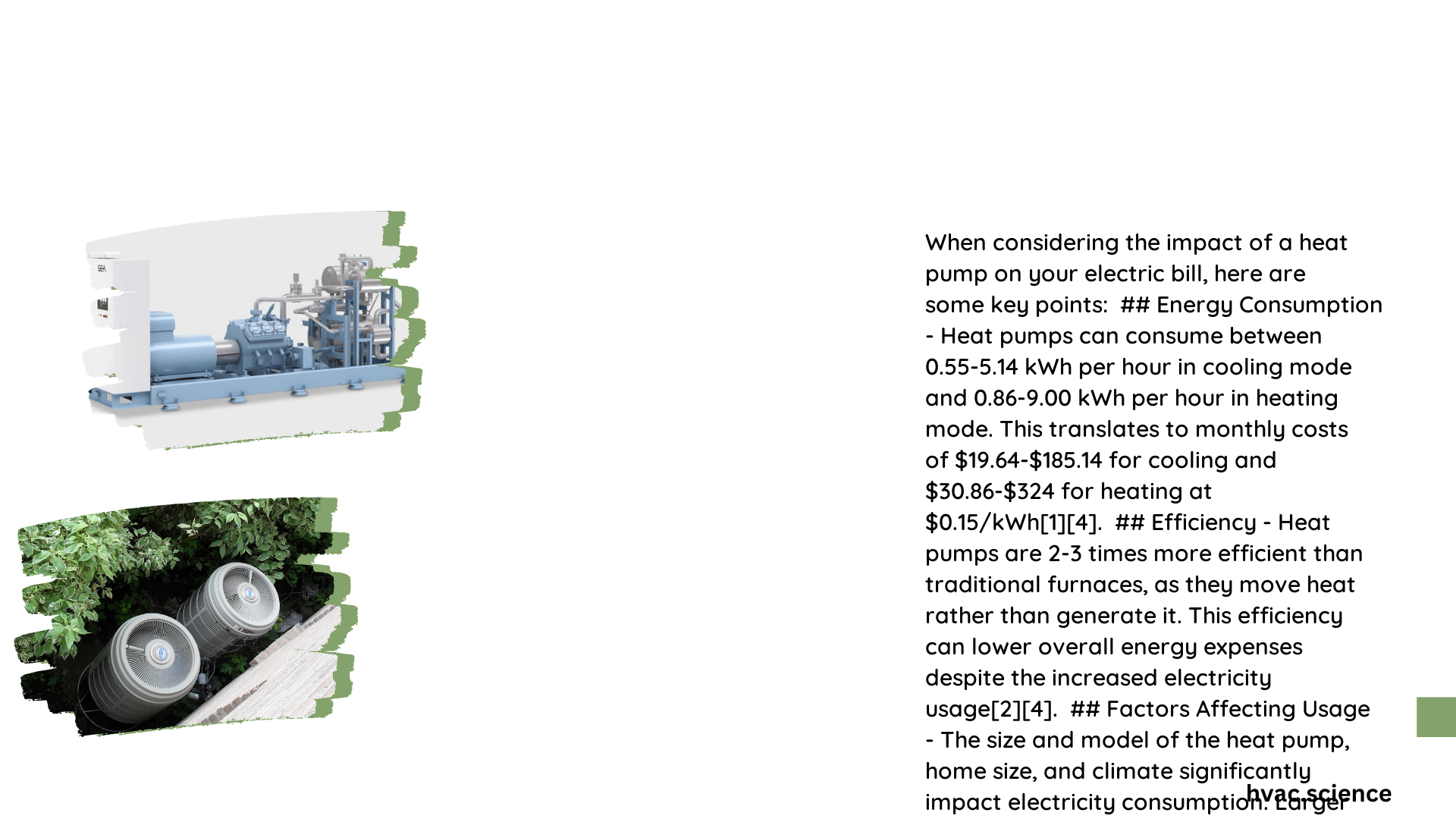Heat pumps are energy-efficient heating and cooling systems that can significantly impact your electric bill. They work by transferring heat from outside to inside your home (or vice versa), using electricity to power the process. Understanding how heat pumps affect your electric bill is crucial for homeowners looking to optimize their energy usage and costs. This article explores the relationship between heat pumps and electric bills, providing insights into efficiency, cost calculations, and strategies for minimizing expenses.
How Do Heat Pumps Affect Your Electric Bill?
Heat pumps can have a substantial impact on your electric bill, both positively and negatively. While they are generally more energy-efficient than traditional heating systems, they still consume electricity to operate. The extent of their impact depends on various factors, including:
- Heat pump efficiency ratings (SEER and HSPF)
- Local electricity rates
- Climate and seasonal variations
- Home insulation quality
- Usage patterns and thermostat settings
Understanding these factors can help you better manage your energy consumption and costs associated with heat pump operation.
What Are the Key Factors in Calculating Heat Pump Electricity Costs?

To accurately calculate the electricity costs of running a heat pump, you need to consider several key factors:
-
Average kWh Usage: Heat pumps typically consume between 2,000 to 15,000 watts, depending on the model and size. For example, a 4,000-watt heat pump would use 4 kWh of electricity per hour of operation.
-
Local Electricity Rates: The cost of electricity varies by region and supplier. In the U.S., the average rate is around 16 cents per kWh, but this can differ significantly depending on your location.
-
Seasonal Variations: Energy consumption changes with the seasons, particularly in colder climates where heat pumps work harder during winter months.
Here’s a simple example calculation:
- Heat pump power consumption: 4,000 watts (4 kWh/hour)
- Daily operation: 8 hours
- Monthly electricity usage: 4 kWh/hour × 8 hours × 30 days = 960 kWh
- Electricity rate: $0.16 per kWh
- Monthly cost: 960 kWh × $0.16/kWh = $153.60
How Does Heat Pump Efficiency Impact Your Monthly Electric Bill?
Heat pump efficiency is measured by ratings such as SEER (Seasonal Energy Efficiency Ratio) and HSPF (Heating Season Performance Factor). Higher ratings indicate better efficiency, which can lead to lower electric bills.
| Efficiency Level | HSPF Rating | Typical COP |
|---|---|---|
| Standard | 10-11 | 2.33 |
| High | ≥11.5 | 2.68 |
A high-efficiency heat pump can result in significant savings. For instance:
- Standard efficiency heat pump monthly usage: 960 kWh
- High-efficiency heat pump monthly usage (assuming 10% reduction): 870 kWh
- Monthly savings: (960 kWh – 870 kWh) × $0.16/kWh = $14.40
Over a year, this could amount to over $170 in savings on your electric bill.
What Factors Influence Heat Pump Energy Consumption?
Several factors can affect how much energy your heat pump consumes, thereby impacting your electric bill:
-
Climate Zone: Different regions have varying heating and cooling demands, affecting the heat pump’s workload and energy consumption.
-
Home Insulation Quality: Well-insulated homes reduce the heat load, leading to lower energy consumption. For example, a well-insulated 3-bedroom house might use around 3,300 kWh per year, while a poorly insulated one could use significantly more.
-
Thermostat Settings: Lowering the thermostat can reduce energy consumption. Setting it to 18°C (as recommended by the WHO) and using nighttime setback temperatures can lead to substantial savings.
-
System Sizing: An incorrectly sized heat pump can lead to inefficiency and higher costs. Ensure your system is properly sized for your home’s needs.
-
Maintenance: Regular maintenance keeps the heat pump operating at peak efficiency. Annual servicing, costing around $70-$100, can prevent efficiency losses and unexpected increases in your electric bill.
How Can You Reduce Heat Pump-Related Electricity Costs?
To minimize the impact of your heat pump on your electric bill, consider these strategies:
- Optimize Thermostat Settings:
- Set your thermostat to 18°C (64°F) during winter
-
Use programmable or smart thermostats for automatic adjustments
-
Improve Home Insulation:
- Seal air leaks around windows and doors
-
Add insulation to walls, attics, and crawl spaces
-
Regular Maintenance:
- Schedule annual professional servicing
-
Clean or replace filters monthly
-
Upgrade to a High-Efficiency Model:
- Look for heat pumps with high SEER and HSPF ratings
-
Consider models with variable-speed compressors for better efficiency
-
Use Supplemental Heating Wisely:
- Avoid relying on auxiliary electric resistance heating
- Consider zoning systems to heat only occupied areas
By implementing these strategies, you can significantly reduce your heat pump’s energy consumption and its impact on your electric bill.
What Are Common Challenges in Managing Heat Pump Electricity Costs?
While heat pumps can be highly efficient, there are some common challenges in managing their electricity costs:
-
Cold Climate Performance: In extremely cold climates, heat pumps may struggle to maintain efficiency, potentially leading to higher electricity usage.
-
Improper Sizing: An undersized or oversized heat pump can lead to inefficient operation and increased energy consumption.
-
Lack of Maintenance: Neglecting regular maintenance can cause efficiency losses and unexpected spikes in electricity usage.
-
User Behavior: Frequent temperature adjustments or leaving doors and windows open can negate the efficiency benefits of a heat pump.
-
Outdated Technology: Older heat pump models may not have the efficiency features of newer units, resulting in higher operating costs.
Addressing these challenges through proper system design, regular maintenance, and educated use can help you maximize the efficiency of your heat pump and minimize its impact on your electric bill.
In conclusion, while heat pumps can significantly impact your electric bill, understanding the factors that influence their energy consumption and implementing effective strategies can help you manage and reduce these costs. By choosing an efficient model, maintaining it properly, and using it wisely, you can enjoy the benefits of a heat pump while keeping your electricity expenses in check.
